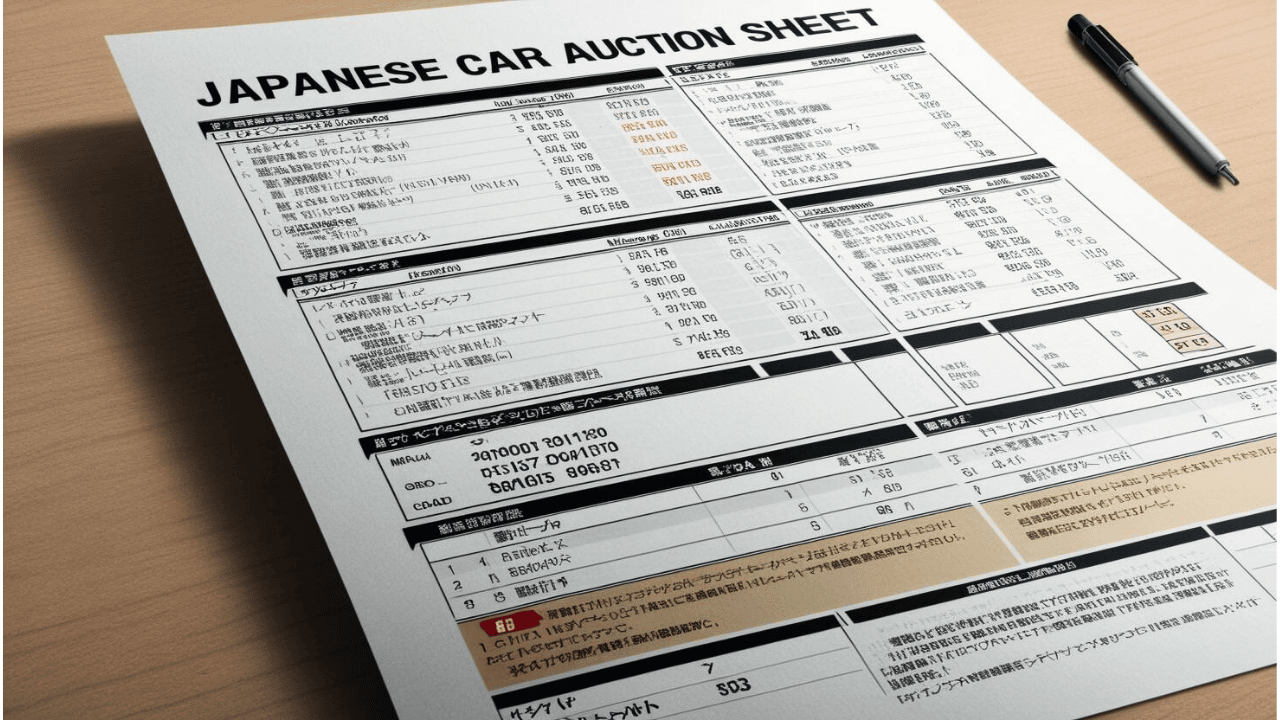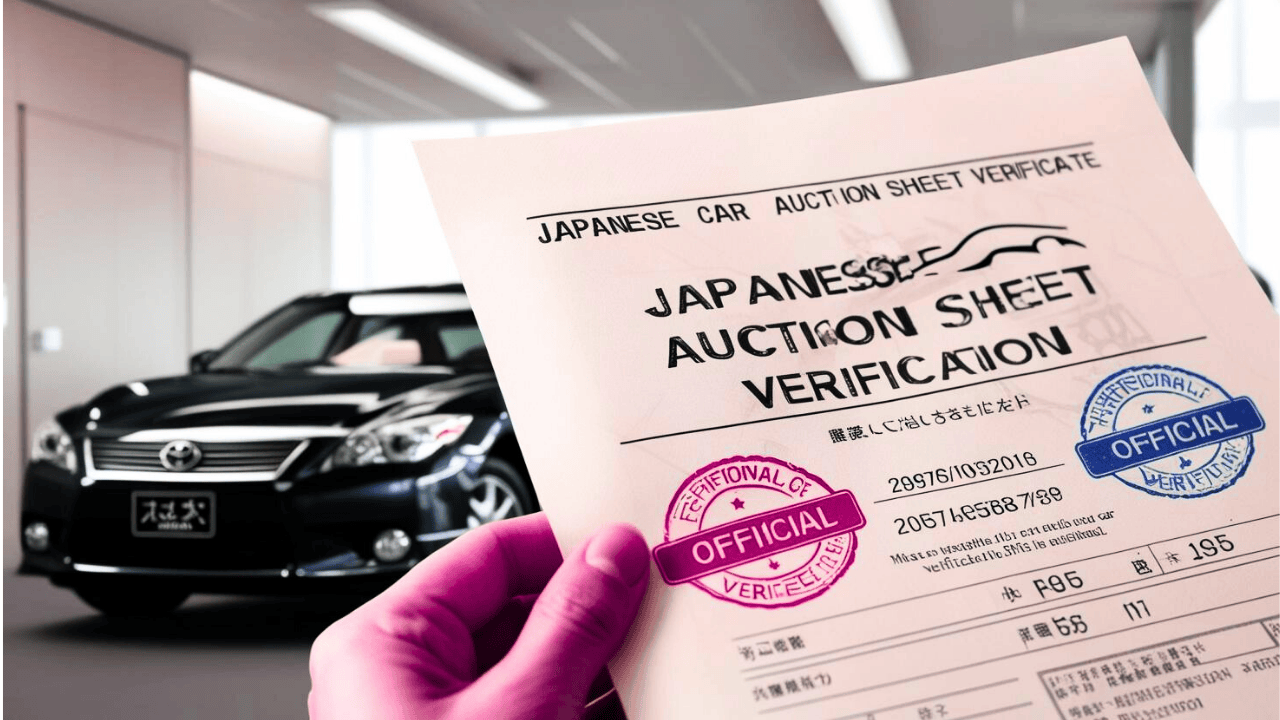
Japan VIN Check: Your Ultimate Guide to Vehicle History and Safety
When purchasing a used car from Japan, ensuring the car's history is crucial. Whether you're buying directly from Japan or considering an imported Japanese vehicle, performing a Japan VIN check is a must. A VIN (Vehicle Identification Number) holds essential details about a car's past, such as accident history, mileage, and previous ownership. In this guide, we will explore how to conduct a Japan VIN check and why it is important for ensuring safety and avoiding potential problems.
What is a VIN, and Why is It Important?
Every car has a unique number called a Vehicle Identification Number (VIN), which acts as the vehicle's fingerprint. Consider it the DNA of the vehicle. Important details about the car's manufacturer, model, year of manufacture, and other details are revealed by this 17-character code, which consists of both letters and numbers.
Conducting a Japan VIN check helps you determine whether a car has been involved in major accidents, if there has been odometer tampering, or if the car was ever reported as stolen. It is a small step that can save you from major headaches and financial loss down the road.
How to Perform a Free Japan VIN Check
Performing a Japan VIN check is easier than you might think. This service is provided for free by a number of websites and programs. All you need is the vehicle's chassis number, also known as the VIN, which is often found on the dashboard, engine compartment, or door frame on the driver's side.
Follow these simple steps:
- Locate the VIN: You can find the VIN on the vehicle itself or in official documents, such as registration papers or insurance forms.
- Choose a VIN check tool: Many online services provide free VIN checks specifically for Japanese cars. These tools help you uncover the car’s history.
- Enter the VIN: Input the VIN number into the selected tool and run the search.
- Review the results: The results will give you a detailed history report, including details such as whether the car was involved in an accident, its auction history, and any mileage discrepancies.
Using a free Japanese VIN check is an excellent first step before making a purchase. However, for a more detailed and comprehensive report, paid services may offer additional data like import/export records and detailed auction sheets.
Decoding a Japanese VIN
A Japanese VIN follows the global standard format.Nonetheless, it is beneficial to comprehend the characters' meaning and structure.
- First three characters: These stand for the World Manufacturer Identifier (WMI), which identifies the manufacturer and the nation of origin of the vehicle.
- Fourth to eighth characters: These include details regarding the model, body style, and engine type of the vehicle.
- Ninth character: This is a security check digit used to validate the VIN.
- Tenth character: Represents the year of manufacture.
- Eleventh to seventeenth characters: These are unique to each vehicle, providing details such as the serial number and assembly plant.
Using a Japanese VIN decoder can quickly break down each section, helping you understand everything from the car's model to where it was made.
Why You Should Check the Chassis Number
In Japan, the chassis number is just as important as the VIN. The chassis number refers to the vehicle’s frame and is typically shorter than the VIN. If you're importing a car from Japan, the chassis number check is often the key to unlocking the vehicle's detailed history.
The chassis number is particularly useful when looking up a car’s auction records. Japanese cars are often sold at auctions, and each car comes with an auction sheet—a document outlining the vehicle’s condition and any past repairs. By entering the chassis number, you can verify if the auction sheet aligns with the car’s current state.
For instance, the Japan Export Vehicle Inspection Center (JEVIC) provides chassis number checks to verify a car's history and condition. Using a free online tool to perform a Japan car history check by chassis number ensures the car’s reported condition matches its real history.
Avoiding Odometer Rollback Scams
One of the biggest risks when buying a used car, especially an imported one, is odometer fraud. This is when the odometer is rolled back to make the car seem like it has less mileage than it truly does. Japanese used cars are known for having low mileage, which is part of their appeal. But beware—this fact also makes them a target for odometer scams.
Performing a Japan VIN check or chassis number check helps you verify the odometer reading against official auction records and past inspections.Any disparities are a warning sign that the vehicle may have been tampered with.
Role of the (MLIT)
In Japan, maintaining the accuracy of vehicle data is a major responsibility of the Ministry of Land, Infrastructure, Transport, and Tourism (MLIT).. The MLIT is responsible for maintaining vehicle records, conducting inspections, and regulating imports and exports. When conducting a Japan VIN check, MLIT data can provide a wealth of information, including the car's registration status, year of manufacture, and whether the car has passed recent inspections.
You can even request an MLIT inspection report before purchasing an imported vehicle. This report will give you an official verification of the car’s condition, ensuring you’re getting a reliable vehicle.
Importance of Auction Sheets
When buying a used Japanese car, an auction sheet is one of the most reliable ways to verify its condition. These documents provide detailed information about the car’s exterior and interior, mechanical status, and any previous damage. The auction house assigns a grade to the car, which gives you a quick idea of its overall quality.
By using a Japan VIN check or chassis number lookup, you can access the car's auction records. Compare the auction sheet with the car’s current condition to ensure everything checks out. It’s also a good idea to look for any remarks regarding repairs or accident history.
Japanese Car Import Regulations and VIN Checks
Knowing Japan's import laws is crucial if you want to import an automobile from that nation. You can make sure the car conforms with these rules by doing a Japan VIN check.. For instance, some countries require cars to be below a certain age or meet specific emissions standards before they can be imported.
By verifying the car’s year of manufacture and specifications through a Japan VIN check, you can avoid the costly mistake of importing a car that does not meet your country’s requirements. Additionally, the VIN check helps confirm the car’s authenticity, preventing any risk of buying a stolen or illegally modified vehicle.
How to Choose the Right VIN Check Service
There are plenty of Japan VIN check services available online, but not all are created equal. Some offer basic, free services that provide limited information, while others charge a fee for comprehensive reports.
When choosing a service, consider the following factors:
- Free vs paid services: A free VIN check gives you basic details, but a paid service often provides more in-depth data, including auction history and accident reports.
- Data accuracy: Choose services that pull from reliable databases, like MLIT records and JEVIC inspection reports.
- Ease of use: Look for services that are easy to navigate, with clear instructions on how to input the VIN or chassis number.
Some of the best-known services for VIN number check Japan include JEVIC, CarVX, and Japan Partner. These services provide comprehensive reports that are highly trusted within the Japanese car import industry.
Frequently Asked Questions About Japan VIN Check
Can I perform a VIN check on any Japanese car?
Yes, you can run a Japan VIN check on most vehicles, especially those manufactured after 1981, when the 17-digit VIN format was standardized.
Is a VIN the same as a chassis number?
Not exactly. A VIN is a unique identification code for the vehicle, while the chassis number refers specifically to the vehicle’s frame. Both are important for checking a car’s history.
How can I verify auction records?
You can verify auction records by running a chassis number check through services like JEVIC or CarVX. These services provide official auction sheets that list the car’s history.
Conclusion: The Importance of VIN Checking
Performing a Japan VIN check is a vital step in ensuring that a vehicle is safe, reliable, and worth the investment. It helps you uncover hidden issues like accident history, odometer fraud, and auction discrepancies, all of which could affect your decision to buy. Whether you're purchasing a car directly from Japan or considering an imported vehicle, taking the time to run a VIN check will give you peace of mind and help you avoid costly mistakes.
When buying a car, it is always better to be safe than sorry. So, before you sign any paperwork or send over money, make sure to conduct a thorough Japan VIN check and protect yourself from potential risks. Happy car shopping!
Tags
Also Read


japanese car auction sheet in english
Understand the Japanese car auction sheet in English with our detailed guide. Learn how to decode grades, conditions, and ratings ...
| 22/05/25

Japan Auction Sheet Verification
Professional Japan Auction Sheet Verification – avoid fraud, confirm vehicle specs, and get a true assessment of auction sheet details. ...
| 21/05/25

How to Buy a Car in Japan Auction
How to Buy a Car in Japan Auction with steps on bidding, inspection, payment, and shipping process for secure and ...
| 29/04/25

how much does window tinting cost
Find out how much does window tinting cost based on vehicle type, tint quality, and installation method. Compare prices and ...
| 28/04/25